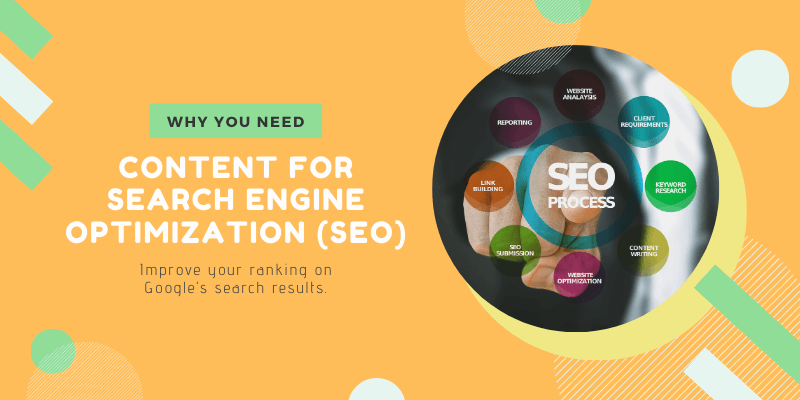
By now, Google is practically a household name. It is the world’s default search engine by a vast margin. You want to find something on the internet, you Google it.
That’s why almost every other business needs SEO, which stands for Search Engine Optimization. It represents what you can do to improve your ranking on Google’s search results.
SEO has many facets; this article will describe why you must look into one of the biggest ones: content.
Before we go into why content is important, let’s first go through how Google looks at your website.
The way your site is assessed by Google
Google has programmed ‘robots’ that crawl through websites across the internet to collect relevant data.
We don’t know the secret sauce of Google’s exact algorithm, but they have made very clear on what the most important factors are to rank your website on their search results.
Here are three of them:
- Backlinks
- The links to your website from other websites, where referral traffic flows through. The more backlinks you have, it is an indication to Google that the webmasters of these other sites find yours valuable enough to link to.
- Time spent
- How much time your visitors spent on your page before clicking away. The longer the minutes and seconds, it is an indication to Google that your website is valuable for human beings.
- Social signals
- How much users have interacted with your website or page via social media platforms. The higher the signals, the more value Google deems your website to have for human beings.
To improve these metrics, you must create content. Why? For one very basic fact.
People won’t visit your website for no reason.
Giving visitors something to come for
Yes, maybe you have visitors looking to buy and/or learn about your products and services. But that only represents a portion of your potential visitors. Many are not ready to become customers, but are instead consumers of content.
When people are not buying, they want to learn something, research a topic, find resources, keep up with the trends, be entertained, and so on。
Therefore, content is the reason people visit your site and stick around. That’s why you should populate your site with valuable content.
Creating content for human interactions
These are three basic types of content:
- Words
- Articles, blog posts, whitepapers, and so on.
- Images
- Infographics, charts, and so on.
- Videos
- Content in audiovisual format.
The most common form of content created for the purposes of SEO is articles. Not only can its raw text form be easily scraped by Google, you can also create long-form content as an article without having to invest in production values that images and video demands.
If you create good content, then:
- Other webmasters will link back to you
- Visitors will spend more time on your site
- Social media users will share and like
Creating content to capture keywords
To have Google become a source of traffic, it’s all about the keywords.
If your website does not contain relevant keywords in any of your pages, then it won’t show up when users search for them.
For example, if you sell cast iron pans, you should have a page to educate people on how to clean them. This way, you can capture those searching for “how to clean cast iron pans”, thereby gaining more traffic from search.
In short, creating content allows you give Google more opportunities to place your web pages on their search results.
In the end, your website and its contents should serve your visitors. Do not try to game Google, they can pick up on that. Instead, put people first. That’s how you make your content valuable.
To take it further, you can extend it into content marketing activities so that your content can serve social media platforms as well. But start capturing Google searches first, that’s where you get visitors with intent to research or purchase
This is a guest post by Justin Wong.
About the author
Justin Wong is the founder and director of content at Write Handed Communications.